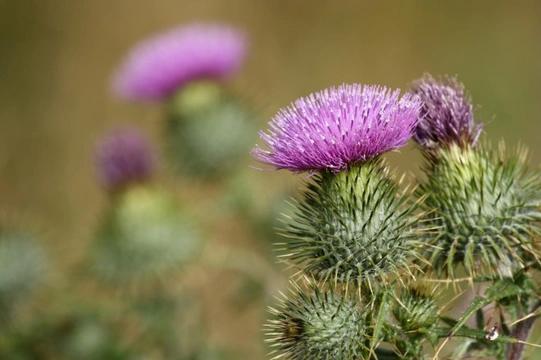
Milk Thistle and Laminitis in Horses
With the spring grasses comes a lot of headaches for owners who know their horses are prone to suffer from laminitis. It can be really frustrating when a horse shows the symptoms of this painful and debilitating disease because it's such a hard condition to manage and treat.
The problem is that no matter how much sugar and starch you take out of your horse's diet and no matter how well you keep their weight down, laminitis can still rear its ugly head when you least expect it. The good news is that recent studies into a herb called Milk Thistle suggest that it can help keep laminitis at bay!
The research which was carried out in Austria showed that the extract from the herb which is called silymarin and milk thistle itself both have anti-inflammatory and anti-oxidant properties which may well help combat the effects caused by endotoxins. It is these endotoxins that damage a horse's sensitive lamellar tissue which is the part of the foot that's affected by laminitis.
Horses Come into Contact With Endotoxins all the Time
Horse's constantly come into contact with endotoxins which are in effect toxins. They are commonly found in their environment and horses also produce very small quantities of these toxins in their digestive tracts. However, a healthy horse easily combats any that may be present on their own without the need for veterinary intervention.
It all starts to go wrong when a horse is ill, when they are being given a course of antibiotics, when their immune systems are compromised or when they are not being well looked after, that laminitis tends to take hold. One of the most noticeable signs of a problem is when there's a separation of the laminae which is a sure sign that endotoxins are damaging a horse's hoof.
More Research Needed
The studies showed that milk thistle and silymarin effectively decreased the amount of endotoxins present in the laminae by a considerable percentage. Although the results of these studies are good news for the horse world, more research is needed in order to confirm whether or not horse owners should start feeding these as supplements to horses known to suffer from the condition as a way of preventing it from taking hold.
The reason being is because the condition is very complex and little is understood when it comes to why some horses are more prone to the developing laminitis than others. On top of this, there are several factors that can trigger the condition which includes trauma. As such, adding milk thistle and silymarin as a supplement to a horse's feed should only be seen as a supportive measure rather than a preventative treatment or cure.
Other Benefits Milk Thistle Offers Horses
A lot of research has been carried out into milk thistle and it has a proven track when it comes to supporting and even healing the liver. The herb can be given to horses, dogs, cats and even birds as well as people who suffer from liver complaints. It's the silymarin as well as the seeds and plant itself that help regenerate healthy cells in a damaged liver by improving the flow of any fat and bile through the organ. Another valuable property the herb boasts is that it is a very powerful antioxidant being a lot stronger than Vitamin E.
Horses in intensive training can also benefit from being given milk thistle as a supplement which is especially true if they are on any sort of medication, drugs or have some sort of synthetic vitamin supplement added to their diets on a regular basis.
Where to Source the Supplement
These days many of the top horse feed manufacturers now produce herbal supplements for horses, one of which is milk thistle and it comes in many forms including the following:
- Seed
- Powdered Seed
- Tincture
- Liquid
- Dried herb
- Bruised seed
The best part is there is no known toxicity to feeding milk thistle as a supplement to horses although if too much of the herb is given, it can cause a horse to scour because it might upset their digestive systems. This is why it's very important to read all the instructions and keep to manufacturers recommended dosages when adding a milk thistle supplement to a horse's normal ration.
Conclusion
Milk thistle is one of the most scientifically researched herbs around and the recent studies that were carried out in Austria, have suggested that supplementing a horse's diet with this herb could help reduce the risk of endotoxins from damaging the sensitive laminae in a horse's hoof which is one of the causes of them developing laminitis. However, more research needs to be carried out before you should start feeding milk thistle to prevent them from developing the condition. The good news is that supplementing a horse's ration with this valuable herb does have other benefits too because it is known to support and repair liver function.



